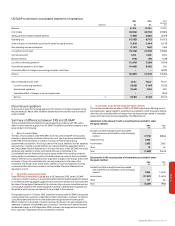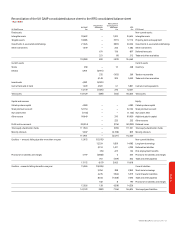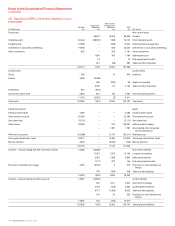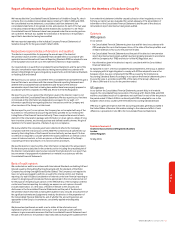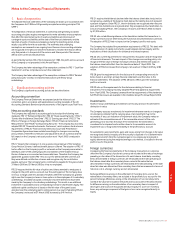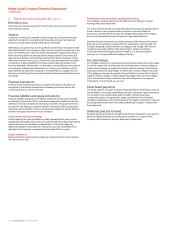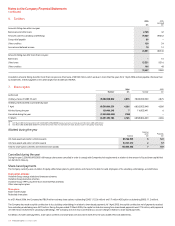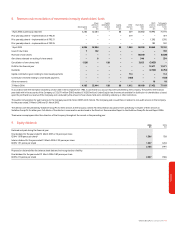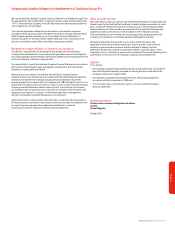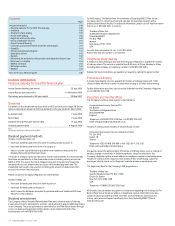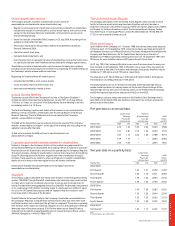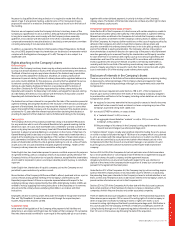Vodafone 2006 Annual Report Download - page 135
Download and view the complete annual report
Please find page 135 of the 2006 Vodafone annual report below. You can navigate through the pages in the report by either clicking on the pages listed below, or by using the keyword search tool below to find specific information within the annual report.
1. Basis of preparation
The separate financial statements of the Company are drawn up in accordance with
the Companies Act 1985 and UK generally accepted accounting principles (“UK
GAAP”).
The preparation of financial statements in conformity with generally accepted
accounting principles requires management to make estimates and assumptions
that affect the reported amounts of assets and liabilities and disclosure of
contingent assets and liabilities at the date of the financial statements and the
reported amounts of revenue and expenses during the reporting period. Actual
results could differ from those estimates. The estimates and underlying
assumptions are reviewed on an ongoing basis. Revisions to accounting estimates
are recognised in the period in which the estimate is revised if the revision affects
only that period or in the period of the revision and future periods if the revision
affects both current and future periods.
As permitted by Section 230 of the Companies Act 1985, the profit and loss account
of the Company is not presented in this Annual Report.
The Company has taken advantage of the exemption contained in FRS 1 “Cash flow
statements” and has not produced a cash flow statement.
The Company has taken advantage of the exemption contained in FRS 8 “Related
party disclosures” and has not reported transactions with fellow Group
undertakings.
2. Significant accounting policies
The Company’s significant accounting policies are described below.
Accounting convention
The Company Financial Statements are prepared under the historical cost
convention and in accordance with applicable accounting standards of the UK
Accounting Standards Board and pronouncements of the Urgent Issues Task Force.
New accounting standards
The Company has adjusted its accounting policies to adopt the following new
standards: FRS 17 “Retirement Benefits”, FRS 20 “Share-based Payments”, FRS 21
“Events after the Balance Sheet Date”, FRS 22 “Earnings per share”, FRS 23 “The
Effects of Changes in Foreign Exchange Rates”, FRS 26 “Financial Instruments:
Measurement” and FRS 28 “Corresponding Amounts”. The Company has also early
adopted FRS 29 “Financial Instruments: Disclosures”, which replaces the disclosure
requirements of FRS 25 “Financial Instruments: Disclosure and Presentation”.
Comparative figures have been restated accordingly for changes in accounting
policy. Details of the effect of the prior year adjustment are set out below and the
full impact on the Company’s net asset position as at 1 April 2005 is analysed in
note 8.
FRS 17 impacts the Company in its role as sponsoring employer of the Vodafone
Group Pension Scheme, a defined benefit pension scheme. The adoption of FRS 17
had no effect on the Company’s profit or net assets as the Company was unable to
identify its share of the underlying assets and liabilities of the Vodafone Group
Pension Scheme on a consistent and reasonable basis. Therefore the Company has
applied the guidance within FRS 17 to account for defined benefit schemes as if
they were defined contribution schemes and recognise only the contribution
payable each year. The Company had no contributions payable for the years ended
31 March 2006 and 31 March 2005 as it has no employees.
FRS 20 requires that the fair value of options and shares awarded to employees is
charged to the profit and loss account over the vesting period. The Company does
not incur a charge under this standard. However, where the Company has granted
rights over the Company’s shares or share options to the employees of its subsidiary
undertakings, an additional capital contribution has been deemed to have been
made by the Company to its subsidiary undertakings. This results in an additional
investment in subsidiaries and a corresponding increase in shareholders equity. The
additional capital contribution is based on the fair value of the grant issued
allocated over the underlying grant’s vesting period. As a result of adopting FRS 20,
the Company’s net assets at 31 March 2005 increased by £419 million.
FRS 21 requires that dividends declared after the balance sheet date should not be
recognised as a liability at the balance sheet date as the liability does not represent
a present obligation. Under FRS 21, interim dividends are recognised when they are
paid, and final dividends are recognised when they are approved by shareholders. As
a result of adopting FRS 21, the Company’s net assets at 31 March 2005 increased
by £1,395 million.
FRS 23 sets out additional guidance on the translation method for transactions in
foreign currencies and on determining the functional and presentational currencies.
The adoption of FRS 23 had no impact on the Company’s profit or net assets.
The Company has adopted the presentation requirements of FRS 25. This deals with
the classification of capital instruments issued between debt and equity and the
implications of that classification for dividends and interest expense.
FRS 26 sets out the requirements for measurement, recognition and de-recognition
of financial instruments. The main impact of this change in accounting policy is to
recognise the fair value of foreign exchange contracts and interest rate swaps on
the balance sheet with effect from the transitional date of 1 April 2004. The
adoption of FRS 26 increased the Company’s net assets at 31 March 2005 by £182
million.
FRS 28 gives the requirements for the disclosure of corresponding amounts for
items shown in an entity’s primary financial statements and the notes to the
financial statements. The adoption of FRS 28 had no effect upon the Company’s
profit or net assets.
FRS 29 sets out the requirements for the disclosures relating to financial
instruments. The Company has early adopted FRS 29 and applied its requirements
from 1 April 2005. The Company is exempt from the requirements of the standard as
full FRS 29 disclosures are available in the Vodafone Group Plc Annual Report 2006.
Investments
Shares in Group undertakings are stated at cost less any provision for permanent
diminution in value.
The Company assesses investments for impairment whenever events or changes in
circumstances indicate that the carrying value of an investment may not be
recoverable. If any such indication of impairment exists, the Company makes an
estimate of the recoverable amount. If the recoverable amount of the cash-
generating unit is less than the value of the investment, the investment is
considered to be impaired and is written down to its recoverable amount. An
impairment loss is recognised immediately in the profit and loss account.
For available-for-sale investments, gains and losses arising from changes in fair value
are recognised directly in equity, until the security is disposed of or is determined to
be impaired, at which time the cumulative gain or loss previously recognised in
equity, determined using the weighted average costs method, is included in the net
profit or loss for the period.
Foreign currencies
In preparing the financial statements of the Company, transactions in currencies
other than the Company’s functional currency are recorded at the rates of exchange
prevailing on the dates of the transactions. At each balance sheet date, monetary
items denominated in foreign currencies are retranslated at the rates prevailing on
the balance sheet date. Non-monetary items carried at fair value that are
denominated in foreign currencies are retranslated at the rate prevailing on the date
when fair value was determined. Non-monetary items that are measured in terms of
historical cost in a foreign currency are not retranslated.
Exchange differences arising on the settlement of monetary items, and on the
retranslation of monetary items, are included in the profit and loss account for the
period. Exchange differences arising on the retranslation of non-monetary items
carried at fair value are included in the profit and loss account for the period except
for differences arising on the retranslation of non-monetary items in respect of
which gains and losses are recognised directly in equity. For such non-monetary
items, any exchange component of that gain or loss is also recognised directly in
equity.
Vodafone Group Plc Annual Report 2006 133
Financials
Notes to the Company Financial Statements


